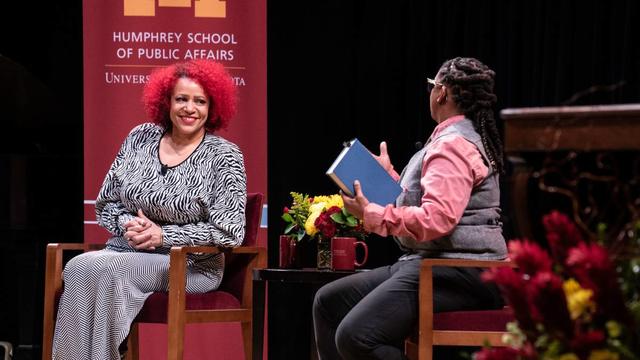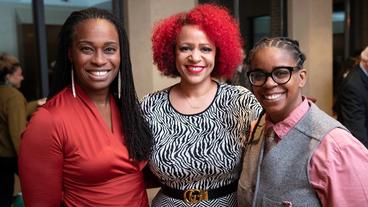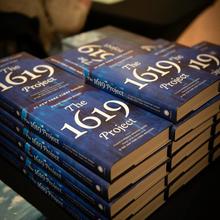Prominent journalist and Pulitzer Prize winner Nikole Hannah-Jones delivered a difficult lesson about racism in America December 6 in the Distinguished Carlson Lecture sponsored by the Humphrey School of Public Affairs.
Hannah-Jones, creator of the 1619 Project, discussed the impact of her work on the public debate around America’s history of slavery and its influence on current society, in front of a near capacity crowd at Northrop.
Hannah-Jones is the editor of the New York Times bestselling book The 1619 Project: A New Origin Story, published in 2021—a collection of essays, poems, and works of fiction that expands on the themes of the original project.
Humphrey School Dean Nisha Botchwey welcomed the large crowd, encouraging them to “seek to understand and hold onto information that allows us to grow beyond where we started when we came through the doors tonight.”
The Distinguished Carlson Lecture Series is presented by the Humphrey School of Public Affairs with support from Carlson and the Carlson Family Foundation.
Hannah-Jones’s conversation with moderator Kyndell Harkness, assistant managing editor of diversity and community at the Star Tribune, was tinged with humor even while covering difficult ground. Here are some excerpts from their conversation, edited for length and clarity.
On the 1619 Project and the book that followed:
I pitched this project in February 2019, and this was the hardest thing I've ever done, in terms of the sheer breadth of what we were trying to do. How do you tell a 400-year story in six and a half months?
I had one mantra: we will be unflinching. This project was going to talk about the violence. Because we obscure, we rationalize the fact that we had chattel slavery for 250 years, and racial apartheid for 100 years. We pretend it was just about people having to work for free, and not the terror. We pretend that racial apartheid was about not being able to sit at the lunch counter, and not the sheer violence that undergirds that type of subjugation.
We had no idea it would go out into the world and become what it became. But we knew we had done justice to our ancestors with this project, and that meant a lot.
This work is emotionally taxing — to spend days and weeks and months, and now years, trying to excavate all the horrors and tragedies that have been visited upon Black people. And once you produce the work, the attacks that come with that are taxing as well.
But every time I come into a room like this I’m reminded that all of the backlash is because so many Americans want to engage in this work. Just knowing that people would come out this evening to discuss things we wanted to look away from. If no one cared, if this was not having an impact, we would not see all this power lined up against it. That’s quite affirming to me.
The Black influence on American democracy:
I wrote about my father’s patriotism in an essay that turned on its head the idea of who democratized our country, and who gets credit for it. Some people get credit for the idea of democracy, but if we talk about actual democracy, Black people have to get the credit for that and yet we don’t.
When literally 95 percent of the Black population was enslaved, [they were] saying, ‘We’re not leaving America. We built the damn railroads, our ancestors shed blood in every war this nation ever fought.’ Contemplate that: Most of your brothers and sisters are in absolute bondage with no right to citizenship in this country, and yet you are claiming this country as your own, saying, ‘Our country is failing to live up to its highest ideals, and we will fight our own country if we need to, to force it to do so.’ You can’t get a higher patriotism than that.
What surprised her most in the book:
I have studied Black history for well over half my life, but in every single essay in the book there was something I had not known. It tells you how much there is to know, but also what a superior job people have done manipulating the history that we’ve all been taught, particularly when it comes to slavery and its legacy.
What probably was the most shocking for me is the essay on how slavery was literally replenished and sustained through the Black woman’s womb.
We don’t often think about the sexual labor of Black women when they were forced to reproduce. There was no such thing as a crime of rape against an enslaved woman. In fact, rape was incentivized through profit because every time a Black woman got pregnant, she was producing a new enslaved person. Black women were being forced to bear their rapists’ children, only to see those children sold away.
You look at Black Americans and you see this rainbow of colors that we are. There’s a reason. When you test the genetics of Black Americans, 25 percent of our DNA traces back to Europe through the paternal line, because that is how pervasive the rape of Black women was. We have to speak this history, even though it is unspeakable.
The other thing that we have not been led to contemplate nearly enough is resistance. People were resisting constantly, in ways big and small, and resisting in a country where we were a small percentage of the population and we couldn’t win. We led a slave revolt, we knew the outcome. When we ran away, nine times out of 10 we knew the outcome, and yet we did it all of the time.
We’re not taught about resistance because then you have to contemplate, what are they resisting, and whom? That also affirms white supremacist ideology. Because if it was so bad, why didn’t we resist? Why did we just wait for white people to liberate us instead of liberating ourselves? But we were and we did.
So this book is about the silences, the way the silences and the things we don’t learn, the things we aren’t taught to contemplate, are shaping our society and we don’t even know it.
Progress, or lack thereof, on addressing structural racism:
Americans are obsessed with the idea of progress, because it alleviates the urgency for us to do anything about the conditions we allow right now. We say, ‘Slavery was wrong, Jim Crow was bad. Things aren’t all the way equal now, but they’re getting better. We’re always moving forward.’ No, we’re not.
The period we benignly call Jim Crow, which was a period of violently enforced terroristic racial apartheid, was not slavery, no. But it wasn’t that much better. We can’t pat ourselves on the back because Jim Crow wasn’t slavery. Just like now, we want to pat ourselves on the back because we no longer have legalized discrimination, though the conditions of Black people have largely remained unchanged.
Because we believe we’re better than we used to be and we will get better in the future, we accept all of the grave inequality and death and suffering right now. That is not the sign of a moral people, and it’s not the sign of a healthy society.
The structure of inequality remains fundamentally unchanged. And we’re OK with that because it’s not as explicit, because we only have to see it if we want to, because it doesn’t seem as bad as it once was. I say, after 400 years, anything less than equality is not enough, and you don’t get to pat yourself on the back.
Reparations for the descendants of enslaved people:
That George Floyd moment, where a white police officer would kneel on a man and leach the literal life out of a man’s body, knowing he is being filmed, and does not worry that he will pay a single consequence – society creates that moment.
What happened to George Floyd also stood in for the larger system that put him in that neighborhood—that redlined, segregated neighborhood—that larger system that created his entire life and the lives of so many other Black folks.
We can’t just ask that the police don’t kill us. That’s the most basic thing in the world, that the state cannot kill its citizens with no consequences, when those citizens have done nothing to deserve death.
The bigger thing, which is what causes the most suffering in this country, is that Black people have close to zero wealth. The typical Black household has one-tenth of the wealth of the typical white household. That’s what shapes our inability to get an education, to buy a house in a safe neighborhood, why there is so much crime.
These things that cause us to suffer all lead back to the fact that slavery was an economic institution. You don’t transport 13 million human beings across the Atlantic Ocean just because you don’t like Africans. They did that to exploit this labor source, to extract wealth from Black bodies and redistribute that wealth to white people and white institutions. Then you create racism to justify this inhumane system of labor exploitation. So understand that slavery is an economic system, and Jim Crow was trying to reify that economic exploitation as closely as possible.
Contemplate what freedom looked like for Black people [after emancipation] when all of a sudden they’re told: ‘You’re free to go. But you have no land, you have no home, you have no property, no tools, no food, no clothes.’ You have nothing, and then you’re told to go live your life.
Then for 100 years, you’re locked out of home ownership, locked out of college, locked out of well-paying jobs. In 1968 you’re told the same thing: ‘Our bad, everybody has the same rights now.’ But you didn’t make up for that 350 years of extraction from Black communities. And even when Black people somehow managed to scrape together some land, scrape together some wealth, they were targeted and it was taken from them.
Every single thing that Black people are told—if we just got ourselves together, bootstrapped ourselves up, we would have the same things everyone else has—has been disproven by data and facts. Nothing can replace 350 years of extraction, except giving that resource back.
I think we all suffer from the poor history we’ve been taught. If more people knew, then we would alleviate the suffering of our fellow Americans and we would try to become the moral people that we believe we are.
Hope for the future:
I don’t find hope that personally useful. Y’all can have hope. It is an important thing, but it's not what motivates me.
I feel like when people ask for hope they just want to be let off. I’m not saying the question isn’t sincere, but what they say is, ‘We’ve done so many terrible things in our society, but you hope it’s going to get better, right?’ So they can feel kind of OK about it. What I’m saying is, it’s not OK. And I don’t want us to feel OK. I want you to leave here with a pit in your stomach—that we could have a better society than we have.
I want to be clear. The 1619 Project is not a story of Black people. It’s a story of America. Black people suffer the worst, but we all are suffering. We are the most carceral nation in the world, but the majority of people in prison are not Black. We have the highest rates of child poverty in the developed world, and most of those children are not Black. There are millions of white Americans who cannot go to the doctor when they’re sick.
All the power of our society went into constructing our systems. The greatest minds—the greatest white minds—in science, the arts, government policy, private policy, helped to create what we see, and now when it comes time to fix it, we do almost nothing. Power is not lined up behind fixing it. We don’t want to put any resources into fixing it. So I just don’t know that we ever will.
We are all suffering from our inability to get over our original sin. We are content with that suffering, as long as we think that the people who are supposed to be on the bottom have it worse than us.
What I’m asking is for us to liberate our entire society, for all of us to be free together. For us not to accept the suffering of someone less than us. Because there are certain people in our society that are allowing all of us to collectively suffer, as long as we are willing to let someone else rule above us.
I don’t have hope that we will do the right thing, because every cross-racial, cross-class movement that is attempted in this country has been destroyed when white people ultimately choose their race over any other form of solidarity. We have to collectively decide that we will not be a society on which we were built, we will be a society based on the ideals of which we were built.
See more photos from the event
About the Distinguished Carlson Lecture Series
For more than four decades, the Humphrey School of Public Affairs, with support from Carlson and the Carlson Family Foundation, has presented the Distinguished Carlson Lecture Series, bringing to Minnesota world-renowned speakers to participate in a forum dedicated to the presentation and discussion of the most important policy issues of the day. The series began in 1980 with a gift from Curtis L. Carlson to honor his late friend, Hubert H. Humphrey, and to “contribute to the intellectual life of the greater Twin Cities community by sponsoring lively forums of broad interest.”
Previous lecturers include Malala Yousafzai, Presidents Jimmy Carter, George H.W. Bush, and Bill Clinton, as well as Gloria Steinem, Jon Meacham, and His Holiness the 14th Dalai Lama. See the complete list here.




